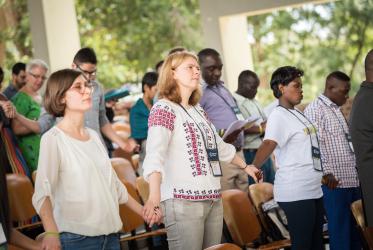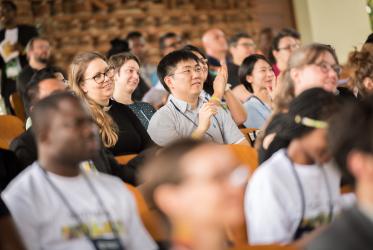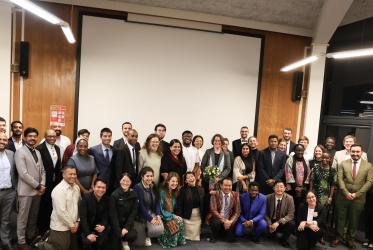“Put your preconceived ideas about young people aside. Listen to them and hear what they are saying to you!”
Michal Szymanczak of the World YMCA presented findings of a YMCA study, “One Million Voices” to participants at a seminar, "Sharing the faith in a multi-cultural and multi-faith world,” held at the World Council of Churches (WCC) Bossey Ecumenical Institute.
The youngest among participants was a monk of the Coptic Orthodox Church from a monastery in the Wadi El Natrun in Egypt. Others were pastors, priests and laypeople working with young adults in multi-cultural settings in Australia, the secularized environment of the east coast of the USA or Sweden, countries with Christian minorities such as India or with strong Christian churches such as Romania or the Ukraine. For 11 days, Bossey became their laboratory for ecumenical life, exploring ways to share faith in today’s multi-faceted world.
“One Million Voices” is a project of the World YMCA, reaching out to young people ages 15-24 in more than 60 countries through local YMCA structures. The process of the study was designed to empower young people by giving them space to speak out. The study reveals that issues of unemployment, human rights, sexuality and the environment are highest on the agenda of young people who often see themselves excluded from the job market and even educational opportunities.
Worldwide, the internet and social media have become their most important source of information and exchange while schools and also churches seem to disappoint them in many respects. Other studies in the USA, the United Kingdom or Sweden show the growing importance of multi-cultural and multi-faith contexts with migrants and refugees that put the credibility of faith leaders and communities to test and force young people who are exposed to multiple and often contradicting influences to negotiate their faith identities.
All this came to life in the sharing of the participants themselves, the morning prayers, reflections on Bible stories, reports on their work and their own research on the situation of young people with different cultural and faith backgrounds. Fr Prof. Dr Ioan Sauca, WCC deputy general secretary and director of the Ecumenical Institute, set the tone with his theological introduction to the theme of the seminar. He said: “Growing into the life with God is never an individual affair, done in solitude and separation. The way to God passes through the brothers and sisters.”
Peter Ponugumati from India shared his experience as a Global Young Reformer, a network of the Lutheran World Federation. WCC staff reported on the International Labour Organization’s cooperation with churches and the Al Azhar University in Egypt on building peace through social justice with the focus on job creation. Young participants also visited the Ecumenical Centre in Geneva.
They also visited Taizé, where thousands of young people gather during the summer break, and they talked with young volunteers and leaders from the Taizé community. They also met with young Jewish women who came to Bossey as part of a delegation from an interfaith organization in Geneva, as well as representative from the Muslim Inter-knowing Foundation.
“We are working with the conviction that the participants are the bearers of the knowledge and active sharing among themselves about their own contexts and what they discover together during the seminar is most important for the success of a seminar,” explained Rev. Dr Martin Robra, WCC programme executive for Ecumenical Continuing Formation. “Actually, creating meaningful spaces for sharing and participation of young people beyond the boundaries of faiths and cultures in working on issues relevant to them is a promising way forward. But it all starts with listening.”






